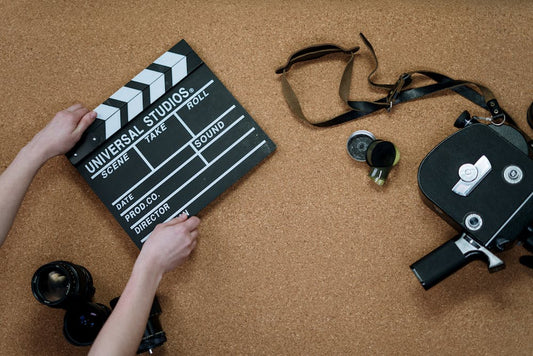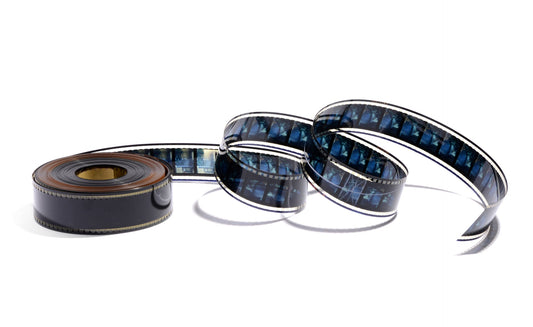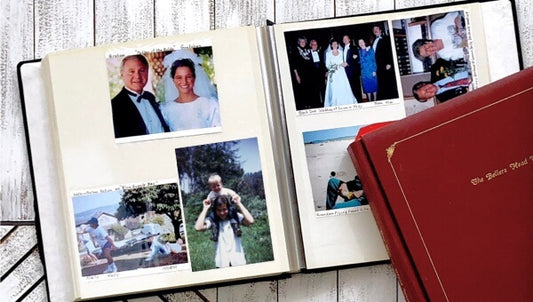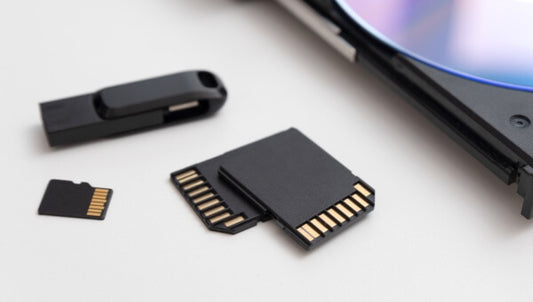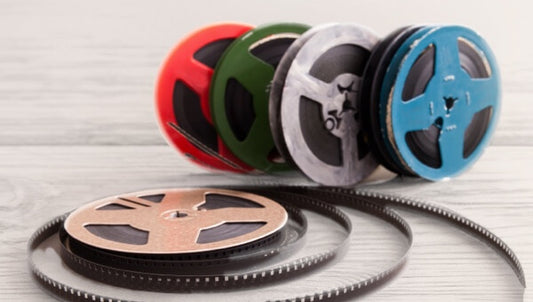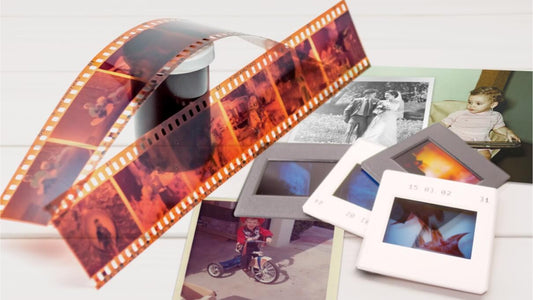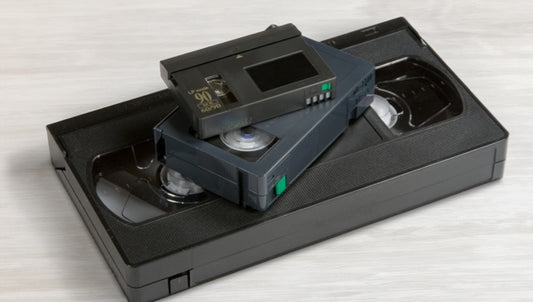Whether you have an unexposed roll of film or developed film that contains your precious memories, it won’t last forever. While film can last decades in optimal conditions, in humid or warm environments it can start to deteriorate much faster. That’s why it’s important to understand how long film lasts and what factors can shorten its life.
When this happens, you could lose your memories to fading, fogging, graininess, and other quality issues. Additionally, old film won’t work properly in a camera because exposure will require more light. That’s why Capture photo scanning and analog preservation experts put together this complete guide to help you determine the answer to, “how long does film last?”
Keep reading to learn how long developed and undeveloped film lasts, factors that influence the lifespan of film, signs that your type of film is deteriorating, and tips to extend the life of your film photography.
Jump to:
How Long Does Film Last?
The lifespan of camera film depends on many factors, but the primary consideration is whether it’s undeveloped, exposed, or developed film. However, a good rule of thumb is that film lasts 10 to 15 years, longer if high-quality film is stored in good conditions. It is also good to look at how long does film last in a camera compared to canisters.

Understanding how long film lasts also means understanding storage, temperature, and chemical stability. Film expiration isn’t just about the calendar- it’s about how the film is treated over time. Many people ask, “does film expire even if it’s stored well?” The answer is yes, but the rate of degradation varies depending on conditions.
How Long Does Unexposed Film Last?
Unused rolls of film typically have an expiration date of 2 years from the date they were made. However, don’t throw out your expired film stock yet. Just because the old film is beyond the expiry date doesn’t mean you can’t still use it.
Film is made of thin strips of plastic coated with a chemical emulsion that contains silver halides. These chemicals react when exposed to light, which creates the image. For color film, the silver chemicals are mixed with color dyes as well.
Over time, these chemicals and dyes begin to deteriorate, which means that the colors lose their vibrancy, contrasts begin to blur and fade, and grain increases. When it gets worse, the expired film will become foggy and ineffective altogether.
You might also be wondering: do film rolls expire even if unopened? The short answer is yes. Even sealed rolls will eventually show signs of degradation. Still, many film enthusiasts have had success shooting with film that's well past its printed date, especially when stored cold.
Over time, these chemicals and dyes begin to deteriorate, which means that the colors lose their vibrancy, contrasts begin to blur and fade, and grain increases. When it gets worse, the expired film will become foggy and ineffective altogether.
However, this process is gradual, which means that you don’t necessarily need to throw out your old rolls of Kodak Ektachrome, Portra, or APS film. In fact, unexposed film can last 25 to 30 years or longer in the right conditions including within a camera. This long shelf life is one reason many people stay curious about how long film lasts even after its expiration date.
How Long Does Exposed Film Last?
If the film is exposed, but not developed, then you have a shorter length of time. In fact, most experts recommend getting exposed film developed within a few days or weeks, but in some cases, exposed film could still last 20 years or longer. This depends on the storage conditions and other factors.
Black and white film is known to last the longest because the dye color shifts faster than the other chemicals. In many cases with black and white film, you can get decent prints out of film 20 to 30 years after it was originally exposed.
If you are wondering how long does disposable camera film last, then the guidelines are similar. If disposable film is used, then it may start degrading after around 6 months. However, if it is unused, it will likely expire in 2 years but could last much longer. This is the same for film that is contained in an SLR film camera.
How Long Does Developed Film Last?
Finally, if you have developed negative film, then the lifespan could be 10 to 15 years. However, it will depend greatly on the quality of processing, film brand, image quality, storage conditions, and more. Regardless, you can expect it to last at least 10 years as long as it’s stored in a place without extreme temperatures or humidity.
Film expiration is a reality even for developed negatives. If you're not careful with handling or storage, fading and color shifts may become visible much sooner. Humidity and light are the most common culprits behind this kind of damage.
If you’re holding on to developed 35mm negatives, it's a good idea to preserve them now through 35mm negatives to digital conversion. That way, even if the original film deteriorates, your memories are safe in high-quality digital form.
Signs That Your Film Has Deteriorated
There are several signs that your film has begun to deteriorate that you need to look out for. If you notice these signs for exposed film, then you need to make sure to get it developed, checked by a professional, or digitized immediately before those memories are lost forever. Understanding these signs early on can make a big difference in preserving what’s left and gives you a better idea of how long film lasts under different storage conditions.

Color Shifts and Fading
One of the first signs that your film is starting to degrade is a shift in color and fading. The colors may appear foggy or hazy and the contrast will become less vivid as the chemicals begin to break down. While film processing won’t be able to recover the original colors, when you develop film, you can prevent further color shifts from taking place. Color slides are especially vulnerable to fading and color shifts. If you notice dull or hazy colors, you may want to consider 35mm slide conversion to jpeg to preserve the details while they’re still visible.
Physical Damage
Another sign of 35mm film, slide film, or even film reel deterioration is physical damage. If the film itself is bent, torn, or folded, then obviously it is in danger of being lost or destroyed. However, it’s also important to note that old film becomes more susceptible to physical damage and in extreme cases can become brittle.
Grainy or Foggy Image Quality
When the chemicals on film break down, you won’t be able to get as high quality with a film camera or when you develop film. This can lead to a foggy appearance or graininess that you may associate with older photos.
Tips for Extending the Life of Your Film
There are some things you can do to extend the life of your film. These tips should work well with any type of film whether it’s unexposed, exposed, or fully developed.

Store in a Cool, Dry Place
Two of the main causes of rapid deterioration are high room temperature and humidity. By storing your film in a cool, dry place you can significantly reduce the degradation and extend the shelf life. You can even store your film in a refrigerator to preserve it for even longer as long as you make sure no moisture can access the film.
Try to avoid storing film near windows, radiators, or anywhere with direct sunlight. Fluctuations in temperature and light exposure can accelerate film expiration. If you’re refrigerating film, it’s best to place it in an airtight plastic bag with silica gel packets to absorb any moisture.
For long-term storage, consider a dedicated container or photo-safe storage box. Label each roll with the date and type of film, so you can monitor how long each has been sitting. This is especially important for photographers who shoot regularly and rotate through film supplies.
Handle with Care
The oils from your hands and other sources can also contribute to faster expiration of film, so it’s important to handle film as rarely as possible. When you do have to handle film, it’s important to wear gloves. Finally, use acid-free envelopes and other storage options for any long-term film storage. You should be able to find them on Amazon or at your local office supply store.
Even a fingerprint can cause lasting damage to film, especially if the roll sits for years before being developed. Always hold film by the edges when possible, and avoid unnecessary handling. Dust, skin particles, and air pollutants can also cling to film and speed up deterioration.
For developed negatives, slide film, or prints, use archival-quality sleeves. Avoid plastic bags or cardboard boxes not labeled “acid-free,” as they can release harmful chemicals over time. Even if the film looks fine now, damage from poor handling can show up later during scanning or printing.
Develop and Digitize Film ASAP
The best thing you can do to preserve your film is to use it, develop it, and digitize it as soon as you can. By using expired film promptly, you can make sure that the image quality is as high as possible. Then, by developing exposed film as soon as possible, you prevent overexposure or deterioration. Finally, by digitizing your developed positive or negative film, you preserve the memories as high-quality digital images that future generations can enjoy and share.
If your film is already exposed, don’t wait months or years to develop it. The longer you delay, the more risk there is of fading, contrast loss, or permanent damage to the image. While developed film still needs to be stored carefully, at least the content is preserved.
Digitization adds an extra layer of security. If the original film is ever lost, damaged, or continues to degrade, digital backups will keep your memories safe. Today’s digitization services make it easy to convert everything from color slides to negatives—whether you’re scanning prints or turning slides into digital.

Preserve Your Film with Capture Before It’s Too Late
While film can last 10 to 15 years or longer, it can start to degrade in as little as 2 years depending on the type of film you have. It’s important to take care of your film to ensure that it lasts as long as possible, but if you have film that contains your most precious memories, the best thing to do is to digitize it.
Capture can digitize your film negatives, reels, photos, home movies, and even digital camera memory cards to preserve them forever on the cloud, hard drive, or as a DVD or USB flash drive.


